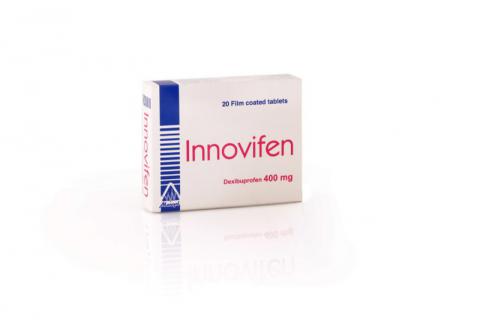Brand Name: Innovifen Tablet
Active Ingredients: Dexibuprofen
When is Innovifen Tablet prescribed for?
- Symptomatic treatment for the relief of pain and inflammation associated with osteoarthritis.
- Acute symptomatic treatment of pain during menstrual bleeding (primary dysmenorrhoea).
- Symptomatic treatment of other forms of mild to moderate pain, such as muscular-skeletal pain or dental pain.
How should you take Innovifen Tablet?
- The dosage should be adjusted to the severity of the disorder and the complaints of the patient.
- During chronic administration, the dosage should be adjusted to the lowest maintenance dose that provides adequate control of symptoms.
- For individual dosage film-coated tablets with 300 and 400 mg dexibuprofen are available.
- The recommended dosage is 600 to 900 mg dexibuprofen daily, divided in up to three single doses.
- For the treatment of mild to moderate pain, initially single doses of 200 mg dexibuprofen and daily doses of 600 mg dexibuprofen are recommended.
- The maximum single dose is 400 mg dexibuprofen.
- The dose may be temporarily increased up to 1200 mg dexibuprofen per day in patients with acute conditions or exacerbations.
- The maximum daily dose is 1200 mg.
- For dysmenorrhoea a daily dose of 600 to 900 mg dexibuprofen, divided in up to three single doses, is recommended.
- The maximum single dose is 300 mg; the maximum daily dose is 900 mg.
- Dexibuprofen has not been studied in children and adolescents (< 18 years): Safety and efficacy have not been established and therefore it is not recommended in these age groups.
- In elderly patients it is recommended to start the therapy at the lower end of the dosage range.
- The dosage may be increased to that recommended for general population only after good general tolerance has been ascertained.
- Hepatic dysfunction: Patients with mild to moderate hepatic dysfunction should start therapy at reduced doses and be closely monitored.
- Dexibuprofen should not be used in patients with severe hepatic dysfunction
- Renal dysfunction: The initial dosage should be reduced in patients with mild to moderate impaired renal function.
- Dexibuprofen should not be used in patients with severe renal dysfunction.
- The film coated tablets can be taken with or without a meal.
- In general NSAIDs (non-steroidal anti-inflammatory drugs) are preferably taken with food to reduce gastrointestinal irritation, particularly during chronic use. However, a later onset of action.
- In some patients may be anticipated when the tablets are taken with or directly after a meal.
- The score in the 200 and 400 mg tablets makes it possible to divide the tablets before administration so as to assist with swallowing.
- Dividing the tablets will not provide an exact “half” dose
When you should not take Innovifen Tablet?
See insert leaflet
Special warning and precautions on using Innovifen Tablet:
See insert leaflet
Possible Drug interaction with Innovifen Tablet:
In general, NSAIDs should be used with caution with other drugs that can increase the risk of gastrointestinal ulceration or gastrointestinal bleeding or renal impairment.
Special information if you are pregnant or breastfeeding
See insert leaflet.
Possible Side effects of Innovifen Tablet:
See insert leaflet

